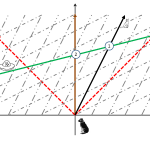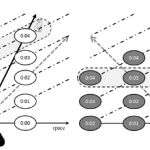Time
There's a new Science Express paper on interfering clocks today, which is written up in Physics World, with comments from yours truly. The quote is from a much longer message I sent-- with no expectation that it would end up as anything other than a pull quote, I might add, but I thought the background would be helpful. Since I ended up doing a back-of-the-envelope estimate for that, though, I thought I would reproduce some of the reasoning here.
The basic proposal idea here is to do an atom interferometer inside a Ramsey interferometer for making an atomic clock. That is, before sending the…
Back when we went to London for Worldcon (and then I went to Sweden for a workshop), I bought a smartphone in Heathrow thinking I could sell it back when I left. That turned out not to work the way we thought, but it's served me well ever since as an e-reader. It can't connect to the local cell network, but I can download stuff via wi-fi, and it's small enough to hold in one hand, and back-lit, which makes it nice for reading in bed and on planes.
The lack of a cell connection, though, means it's just running on its onboard clock, so has gotten out of synch with my US phone. But even that is…
I wrote up another piece about football for the Conversation, this time drawing on material from Eureka, explaining how great football players are using scientific thinking:
Seattle Seahawks cornerback Richard Sherman gets called a lot of things. He calls himself the greatest cornerback in the NFL (and Seattle fans tend to agree). Sportswriters and some other players call him a loudmouth and a showboater. Fans of other teams call him a lot of things that shouldn’t see print (even on the internet). One thing you’re not likely to hear anyone on ESPN call Sherman, though, is “scientist.”
And…
(That title doesn't quite scan as is, but if you stick an "a" in there, you can sing it to the tune of a song from "Fiddler on the Roof"... You're welcome.)
The last time I taught my "Brief History of Timekeeping" seminar was in 2012, so I spent a bunch of time on the Mayan calendar. This time around, we've lost the obvious pop-culture hook, but it's still so weird and fascinating that I spent a class on it last week. One of the things we talked about was what this system (what we know of it) says about the Maya concept of time. There's a very obvious contrast between the interlocking…
I exchanged a bunch of emails a week or two ago with a journalist who was working on a story involving the possibility of faster-than-light travel. He wanted me to check some statements about the relationship between FTL and causality. FTL creates problems for causality, because if you have an object moving faster than light, there will be pairs of observers who see events involving the FTL object happening in different orders, which means somebody will see an effect happen before its cause.
I talk about this is How to Teach Relativity to Your Dog using the example of a stationary dog, a…
Last year, Alan Alda posed a challenge to science communicators, to explain a flame in terms that an 11-year old could understand. this drew a lot of responses, and some very good winners. This year's contest, though still called the "Flame Challenge," asked for an answer to the question "What Is Time?"
This is a little closer to my corner of science, so I considered entering, but as previously noted, I'm crushingly busy at present. And either scripting/ shooting/ editing a video, or doing the necessary work to hack a written response down to the prescribed 300 characters was more time than I…
SCENE: The library at Chateau Steelypips. DADDY is typing on the computer, while THE PIP plays on the floor. Enter STEELYKID.
STEELYKID: I'm already four years old.
DADDY: Yes, yes you are.
THE PIP: Thbbbbbbbpppt!
STEELYKID: How old is The Pip?
DADDY: Eleven months. Not quite one year.
STEELYKID: When The Pip is four, how old will I be?
DADDY: You'll be seven.
STEELYKID: And when he's seven, how old will I be?
DADDY: You'll be ten.
THE PIP: (pulls himself to a standing position) GA BA DA BA Phbbbbt! (falls down)
STEELYKID: Daddy, how old are you?
DADDY: I'm forty-one.
STEELYKID: And when I'm…
We're in the home stretch of this term, and it has become clear that I won't actually be using the toy model of the arrow of time I've talked about in the past in my timekeeping class this term. These things happen. Having spent a not-insignificant amount of time playing with the thing, though, I might as well get a final blog post about it, with something that sort-of worked and something that shows why I'm not a computational physicist:
First, the thing that sort-of worked: in thinking about trying to use the code I wrote, I was struggling to come up with a way to quantify the apparent…
It's been a little while since I wrote up what I've been doing in my "Brief History of Timekeeping" class, because I was out of town, and then catching up from being out of town. Some of this material has already appeared here, though, so I can hopefully catch up a lot of stuff in one post.
The material that will be most interesting to random readers of the blog is the "How to" section, from a couple of weeks ago, which were the lecture form of the How to Read a Scientific Paper and How to Present Scientific Data posts here. The paper-reading class was on Monday and the data-presentation…


